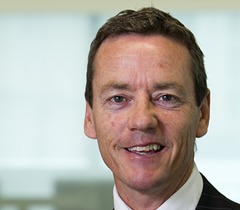Media Release: Cranleigh, May 11, 2015
Water company would save $468 million
An independent report to three Waikato councils says they can save nearly half a billion dollars within the next three decades by forming a ratepayer-owned company to manage water infrastructure in Raglan and other parts of the Waikato.
Last year Hamilton city, Waipa and Waikato district councils funded a report to scrutinise three options for the delivery and management of water services. The report from independent consultants Cranleigh was released today. It recommends the three councils transfer their water assets into a single ratepayer-owned and council-controlled organisation (CCO). Councils should retain ownership of stormwater assets but outsource their management to the CCO, the report says.
Transferring publicly-owned water assets into a private company is not an option. Privatising council-delivered water services is against the law in New Zealand.

Cranleigh managing director Paul Bayly says forming a CCO would “conservatively” save the community more than $468 million over 28 years or $107 million over 10 years. It would also offer other benefits including a much stronger regional water network, cleaner drinking water and wastewater, a greater likelihood of attracting and retaining expert water staff and the creation of a regional centre of excellence other councils could tap into.
“The savings, nearly half a billion dollars, are significant on their own,” Bayly said. “But it is the non-financial advantages, including unlocking the region’s economic potential which are just as important. For example, some industries can’t even operate in the sub-region because of challenges around water and the way the current model works.”
The report recommends a jointly-owned CCO be a not-for-profit company acting in the best interests of water customers. Any surpluses gained from savings should be re-invested in the waters network to improve environmental performance or returned to water customers as reduced water costs, it says.
It recommends a board of directors appointed by all three councils govern the CCO. A joint committee of elected councillors would overview the company’s performance and set the parameters under which it could operate.
“The delivery of water is a core activity and we very strongly believe that councils, as owners of the company, should have a strong influence. ”
“We are not, in any way suggesting that councils ‘walk away’ from water. We’re saying entirely the opposite. For the good of the region, we believe there needs to be a far stronger, more comprehensive and longer-term focus on water infrastructure by people whose only role is to deliver the best possible water services at the best price. At the moment, water infrastructure is fighting for its share of funding among all the other services that councils are responsible for. ”
The report investigated two other options including retaining the status quo with all three councils continuing to run their own water operations. It said the status quo would always offer “only basic service delivery and performance and at a higher cost to ratepayers”. Waipa and Waikato district councils, in particular, face challenges in meeting national drinking water standards and complying with environmental rules.
Bayly said plans were already in place to address those issues with the three councils looking to spend a combined $764 million over the next decade on water infrastructure.
“But the funding challenges, given predicted population growth, are very real and it’s ratepayers and developers who pay for it. ”
The report found the three councils could save $104 million over 28 years by sharing more services but said co-ordination costs could “easily exceed the savings”. The success of a shared service model would depend on “continued strong goodwill” between the councils over many years and was rarely successful, the report said.
Bayly said the report did not consider any issues around tariffs, including water meters.
“This report is about infrastructure. It’s got nothing to do with how individual councils may or may not choose to recoup their costs.”
The report estimates that under a CCO staff numbers across all three councils could reduce by 36 over three years.
“This is within the levels of normal staff turnover so we would anticipate very few if any redundancies. “
Waikato Mayor Allan Sanson, who chaired the governance group of councillors overseeing the report, said the recommendation to form a CCO was now “squarely in the hands of individual councils”.
“Only a recommendation has been received. No decisions have been made and won’t be made for some time yet and certainly not without public input. There’s a lot of questions that have to be answered and each council will need to consider the report separately and come to its own conclusion.“
For a copy of the full Cranleigh report (including a summary report) plus a copy of the engineering analysis, go to www.waterstudywaikato.org.nz


Raglan hasn’t been looked at in this report. It says, “The study area was focused around the Hamilton urban centre. Isolated schemes such as Raglan, northern Waikato District communities and other distant small satellite supplies were excluded from the extent of this analysis.” – http://www.waterstudywaikato.org.nz/uploads/files/MOTT_Final_Appendices.pdf
Interesting John. Seems strange then that Cranleigh sent this media release to the Raglan Chronicle and to Raglan 23.
Although the report doesn’t cover Raglan, we pay the same rates as other towns, so savings there will save us money, just as the costs there have pushed our charges up. It’s the same treatment that expects us to save water in summer, even though we’ve got plenty.